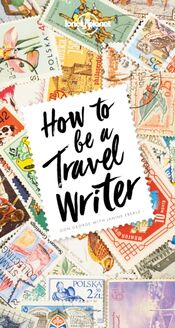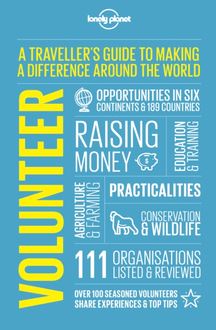Lonely Planet How to Be A Travel Writer , livre ebook
91
pages
English
Ebooks
2017
Vous pourrez modifier la taille du texte de cet ouvrage
Obtenez un accès à la bibliothèque pour le consulter en ligne En savoir plus
Découvre YouScribe et accède à tout notre catalogue !
Découvre YouScribe et accède à tout notre catalogue !
91
pages
English
Ebooks
2017
Vous pourrez modifier la taille du texte de cet ouvrage
Obtenez un accès à la bibliothèque pour le consulter en ligne En savoir plus
Publié par
Date de parution
01 juillet 2017
EAN13
9781787010000
Langue
English
Poids de l'ouvrage
2 Mo
Publié par
Date de parution
01 juillet 2017
EAN13
9781787010000
Langue
English
Poids de l'ouvrage
2 Mo
Contents
Chapter 1: So you want to be a travel writer…
The rewards of travel writing
What do you want to write?
Do you have what it takes?
Getting published
Chapter 2: A short course in travel writing
Finding your story
Understanding travel trends
Researching your story
Shaping your story
Bringing your story to life
Finding your style
Rewriting and self-editing
Chapter 3: Getting published
Breaking into print media
Writing for newspapers
Writing for magazines
Press trips and freebies
Syndicating your stories
Writing books
Chapter 4: Writing a travel blog
Why do you want to blog?
Setting up your blog
Writing your blog
Monetizing your blog
Chapter 5: Life on the road
The realities of travel writing
Making money as a travel writer
Tools of the trade
Career maintenance
Courses
Basic administration
Chapter 6: Becoming a travel photographer
How photography helps your writing career
Choosing your gear
Travel photography tips
Chapter 7: Resources
Online resources
Resources for writers
Online courses
Reference and tools
Travel trends and information
US resources
UK resources
Australian resources
Sample paperwork
Glossary
About the authors
Acknowledgements
Travel writer. Those two words are among the most alluring in the English language. No less a luminary than Mick Jagger has said that if he couldn’t be a rock star, he’d like to be a travel writer. Drew Barrymore has claimed the same.
It is an enticing image. There you are, lying on a chaise longue on a white-sand beach by an aquamarine ocean, describing how the palm trees rustle in the salt-tinged breeze. Sipping a café crème in a Parisian cafe, scribbling impressions in a battered notebook. Bouncing through the African bush, snapping photos of gazelles and lions, then ending the day listening to spine-tingling tales over gin and tonics in the campfire’s glow.
If you love to travel and you love to write, the dream doesn’t get any better. But how does it tally with the reality?
The rewards of travel writing
Every year a few dozen people around the world make a living traveling and writing full-time – and if that’s your goal, go for it! This book will give you all the information and inspiration you need in order to try to reach that dream.
But you don’t have to get paid full-time or even part-time to profit from your travel writing. Whatever your goals as a traveler and writer, the rewards of travel writing – and of approaching travel with the travel writer’s mindset – are numerous. First and foremost, you become a better traveler. You arrive at your destination having already learned something of its history, culture and important sites, making you far better able to explore and appreciate what it has to offer. Also, because you are on the lookout for trends, unique places to visit and essential hot spots, you gradually build up a store of knowledge, becoming more and more of a travel expert.
When you are on the road, traveling as a travel writer will force you to pay attention. You will look more closely, listen more clearly, taste more carefully – and continually reflect on what you’re experiencing. As a result, your travels will be deeper and richer. In addition, you will often be able to go behind the scenes at a restaurant, store or hotel, to take advantage of special access to a historical site or museum exhibit, and to speak with intriguing people – from archaeologists and curators to chefs and shamans – whom everyday travelers would not be able to meet.
Finally, after you have returned home – or if you’re blogging, while you’re still on the road – you will be able to relive your journey over and over in the course of writing about it. And when your account is published, sharing your travel experiences with others – whether in a magazine, newspaper, travel website or personal blog – will further multiply your pleasure, forging connections with others who share your passions. All these effects will broaden and extend the significance and depth of your travels.
These riches come with a corresponding responsibility, of course. As a travel writer you will have a fundamental commitment to your reader to explore a place deeply and fully, and to report the information your reader needs to know by writing an honest, fair, objective and accurate portrayal of that place. Integrity is the travel writer’s compass and key.
What do you want to write?
The travel-writing trail is long, and there are numerous destinations along the way, from Just-Blogging-My-Journal and Writing-as-a-Hobby to Trying-to-Make-a-Living and Want-to-be-the-Next-Bill-Bryson. Travel publishing today presents an unprecedented wealth of mentors to learn from and outlets to target.
If your principal goal is to share your travel experiences with others, without necessarily receiving compensation, that’s easier now than ever before. You can create your own space online where you can post your writings and photographs. In thousands of blogs, everyday travelers are sharing their wanderings with the world. There are also community websites where you can post your experiences and opinions. If you just want to create and communicate, these options are for you.
If you want some compensation for your creative communication, you’ll want to target websites that pay, as well as newspapers and magazines. Starting a blog and building it to the point of making money is an option for entrepreneurial writers, or it can act as a stepping stone to other opportunities. Writing books, whether guidebooks or travel literature titles, is another option.
Writers dedicated to making a living from their travel writing will consider all of these and aim for a mix that makes best use of their skills and experience to maximize exposure and earnings.
A (very) short history
Travel writing is an ancient impulse: people have been sharing accounts of their journeys ever since they first began to wander. The earliest wall paintings present the prehistoric predecessors of Bill Bryson and Paul Theroux recounting their adventures in the larger world. The Greek historian Herodotus is generally credited with writing the first travel book, History of the Persian Wars , with its vivid depictions of exotic sites, rites and fights, in 440 BC. Through the ensuing centuries, traders and explorers from Marco Polo and Christopher Columbus to Henry Morton Stanley and Charles Darwin wrote diaries and dispatches describing their adventures and discoveries in far-flung lands.
In the 20th century, travel writing came into its own as a flourishing independent genre with the emergence of such extraordinary writer-travelers as Patrick Leigh Fermor, Wilfred Thesiger, Eric Newby, Colin Thubron and Jan Morris, and continued to evolve into the 21st century with the work of such masters as Paul Theroux, Bill Bryson, Pico Iyer, Tim Cahill, Stanley Stewart, Kira Salak, Anthony Sattin and Rory MacLean.
The digital revolution has allowed travelers everywhere to publish hitherto personal travel journals online and created a brand-new breed of travel writer: the travel blogger. Writers and content creators with access to video, instantly updatable content and massive online communities have ushered in a new age of travel communication. Next stop? Absolutely anywhere you want to go.
Do you have what it takes?
While travel writing can be one of the most enjoyable professions on the planet, it’s not for everyone. In fact, trying to make a living as a travel writer can be extremely demanding and daunting, requiring a particular temperament and setting some harsh limits on your lifestyle.
Of course, you need to have a way with words and an impulse to express yourself – the urge to fill an empty page. But beyond that, what are some of the quintessential qualities you need?
Be flexible
One of the hallmarks of the travel writer’s life is its general instability and spontaneity. This is equally true both at home and on the road. At home, you have to be able to drop everything and take off for a far-flung destination at a moment’s notice. Your life is dictated by the whims of editors and printer deadlines. To a certain extent, you can negotiate timelines with editors, but often their deadlines just cannot be adjusted – and then, if you’re not flexible, you risk losing the commission (or assignment, as it is called in the USA). You might also risk building yourself a reputation for saying ‘no’, which you definitely don’t want to have in the close-knit travel editorial world.
On the road, you also need to leave room for the unexpected. You may need to alter your itinerary to take in a once-every-seven-years festival you hadn’t known about, or to spend an impromptu afternoon with the winemaker who promises to make a fascinating subject for your article.
Be adaptable
The second quality is a corollary to the first. If you want to maximize your chances as a travel writer, you have to be just as ready to explore the heart of Paris and the heart of Papua New Guinea. This means that you need to have a closet full of suitable clothing and gear but, even more important, you have to have a head full of suitable attitudes. Are you equally at home on high seas and low roads? Can you keep your cool in hot situations? Is your stomach strong or are you susceptible to illness? Could you hop from an expedition ship in the Antarctic to a $15-a-night hut on an isolated South Pacific island and then to a five-star hotel in London? To take the maximum advantage of such opportunities, you have to be adaptable.
Live modestly
Let’s get this out of the way right now: it’s not likely that you’re going to get rich as a travel writer. Not in terms of money, anyway. You will certainly accumulate an uncommon wealth of experience, but to be a travel writer, you need to be able to live on a precarious income. If you are a freelancer you never know how much you’re going to earn in a ye














